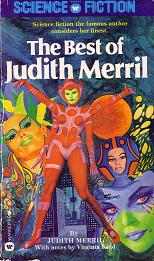domesticity, maternity, and morality
Judith Merril, "That Only a Mother" (1947)
Available in The Best of Judith Merril and in Out of Bounds: Seven Stories by Judith Merril, The Bud Foote Science Fiction Collection, Georgia Tech Library Archives
1953. It is wartime: the atomic bomb has been dropped and soldiers are exposed to radiation at increasingly high rates. Perhaps not surprisingly,, infantile deformity is also on the rise and infanticide is being reported in the press at unheard-of rates. Written at the height of the Cold War, Judith Merril's short story "That Only a Mother" clearly invokes and manipulates widespread cultural anxieties about nuclear war and science gone bad. Amidst all this, Merril's heroine Margaret happily anticipates the arrival of her first child, determined to avoid reports of infanticide and to believe that deformity will not taint her child. Her husband, Hank-a weapons designer busy with wartime business--is away for most of Margaret's pregnancy, returning home only when the child is 10 months old. To Hank's disbelief (and Margaret's doting pride), the child is able to talk and sing even at this early age; she seems be a truly exceptional child. Unfortunately, as Hank realizes when he returns home, there is more to the story than that: the baby is also hideously deformed-a wormlike creature without arms or legs-and Margaret appears to have gone completely insane, unable to see her child as anything other than a brilliant, perfect prodigy. The story closes in stark contrast to Margaret's general optimism, as Hank takes the child in his hands and strangles the baby.
It
is arguable that Merril is in dialogue with Shelley simply because she
is a woman writing science fiction, however, themes drawn from Shelley's
legacy resonate through out. Unlike Shelley's book, "That Only
a Mother" is set primarily in the domestic sphere - Margaret the
picture of 1950s domesticity. Like Frankenstein, "That Only
a Mother" is framed with letters, allowing us to get multiple perspectives
(that of Margaret's as well as Hank's) into the domestic sphere. Perhaps,
however, Merril most engages with Shelley through her anxiety about
reproduction and science. Throughout, Merril shows reproduction gone
awry with alarming rates of infantile mutation and even more alarmingly,
rates of infanticide committed by fathers at an astounding rate. In
essence, then, nuclear war destroys-rather than preserves-the nuclear
family.
